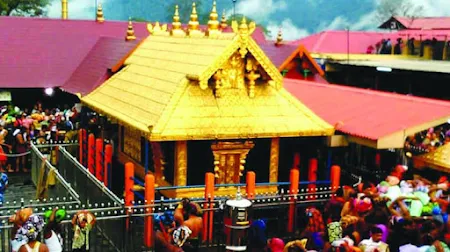The historic judgement of allowing women to pray at Sabarimala Temple reflects the values of gender equality, liberty, dignity, and the Right to Freedom of Religion provided under Article 25 of the Indian Constitution.
The year-long practice of protecting the celibacy of Lord Ayyappa at Sabarimala Temple. This temple in Kerala barred women aged between 10 and 50 from entering the temple to preserve the year-long practice of protecting the celibacy of Lord Ayyappa at Sabarimala Temple. The rules which mandate the ban were listed in Kerala Hindu Places of Worship(Authorisation of Entry) Rules of 1965
By 2006, a petition filed in the Supreme court by the Indian Young Lawyers Association on the ground that the rule violates the fundamental rights of Indian citizens(Article 25) Right to Freedom of Religion
Customary morality cannot be a guide to modern life:
Relation with God is a transcending one. There is no place for physiological and biological barriers. Those are created by social dogma, stereotypes, and prejudice.
Prohibition was founded on the notion that menstruating women are polluted and impure. The deity in Sabarimala is himself a 'naishtika brahmachari' or external celibate.
But the ban was actually the result of Patriarchy in religion. Social discrimination based on menstrual status, a form of untouchability. This violates the fundamental rights of Indian citizens.
ARGUMENTS:
1. "The devotees of Lord Ayyappa are exclusively Hindus and don't constitute a separate religious denomination" -Chief Justice
2. A deity in a temple does not have constitutional rights. 'Purity and Pollution' stigmatized individuals. To exclude women was derogatory to equal citizenship -Justice D.Y.Chandrachud
3. Justice Rohinton F.Nariman- Right to practice religion claimed by the thanthris and worshippers must be balanced with gender equality
4. The only dissenting view in the judgement by Justice Indu Malhotra - Judicial review of religious practice would negate the right to freedom to practice a religion based on their religious faith and beliefs
FREEDOM TO PRAY
The historic Judgement of allowing women to pray at Sabarimala temple paves the way for progressive Indian society and alters the customs with the changing times. Gender discrimination and social exclusion must end in every sphere of life including religious and cultural corners. But still, various practices discriminate not only against women but other religious groups in various temples in different parts of our country. There is a need for an hour to make various religious denominations in conformity with the Constitution of India. Change should be accepted for progression and creating an egalitarian society.
Supreme Court is likely to examine the Sabarimala verdict(2018) through 9 judge bench along with other contentious issues of discrimination against Muslim and Parsi women by exercising its legal jurisdictions.













Social Plugin